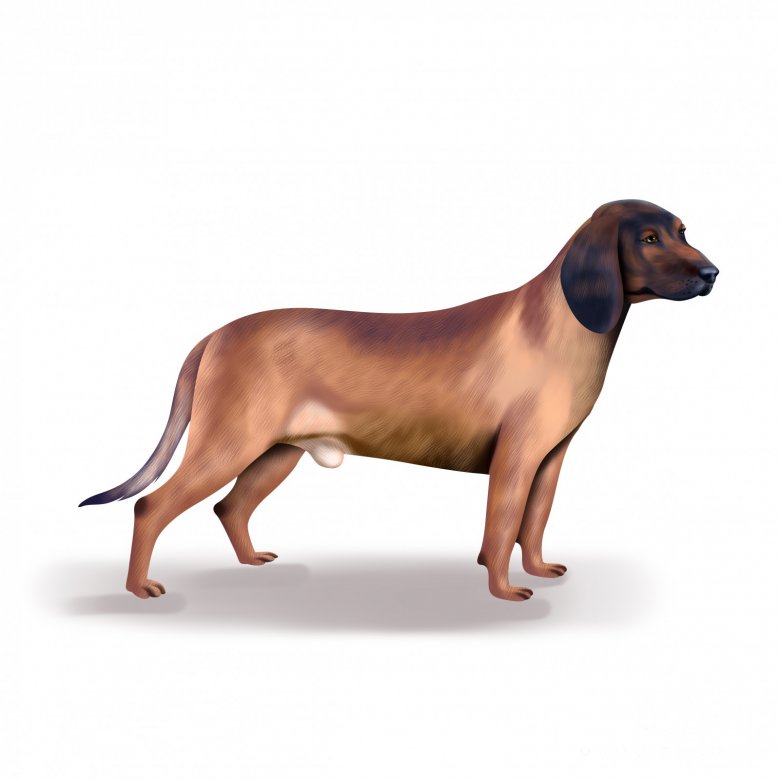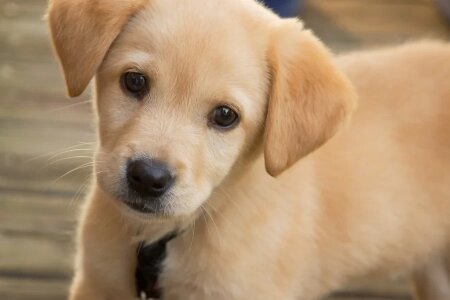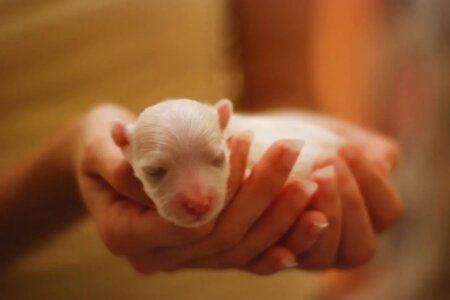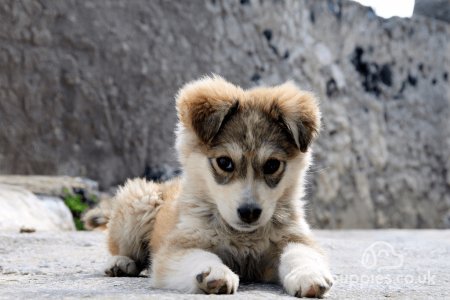Deep in the heart of rural Bavaria, where rolling green hills meet the Bavarian Forest, the noble Bavarian Mountain Dog is sure to be found as a loyal scent hound and companion to the locals. In this land full of culture, including beer, Oktoberfest, and lederhosen/dirndl, the Bavarian Mountain Hound is revered for its many great qualities. As puppies, Bavarian Mountain Hounds are cute and adorable. As they grow, they’ll require a strong sense of authority to train them and to teach them obedience and loyalty, a quality which they excel at. For this reason, they may not be the best choice for first-time puppy owners, but for those with experience raising puppies, this breed is excellent both in the home and in the hills where it was bred to roam.
Why Bavarian Mountain Hounds are Great
Some highlights of Bavarian Mountain Hounds:
Rarity: this breed is rare outside of its native Bavaria and is not common at all in the UK. This makes them an exotic and attractive choice.
Loyalty: this breed is known to be loyal to owners and their families.
Grooming: Bavarian Mountain Hounds require less grooming than most other breeds.
Child-friendly: this breed gets along well with families with children.
Shedding: this breed sheds some hair, but much less than other breeds of a similar size.
Things to Consider when Looking at Bavarian Mountain Hounds for Sale
Some downsides to the Bavarian Mountain Hound:
Strangers: this breed is protective and naturally wary of strangers and may bark or show suspicion towards visitors.
First-time owners: although they can be trained easily, Bavarian Mountain Hounds also have a mind of their own and require a strong sense of authority to teach them obedience. They are therefore not the best puppy choice for first-time owners.
Dog-friendly: this breed can show aggression towards other dogs and should not be purchased if another dog lives in the home.
Stubborn: Bavarian Mountain Hounds have a stubborn streak and may disobey or do as they please if owners are unable to demonstrate their authority and teach them their role.
History of the Bavarian Mountain Hound
Known in Bavaria as the Bayerischer Gebirgsschweißhund (lit. ‘Bavarian Mountain Bloodhound/Leashhound’) as a breed of scent hound, the Bavarian Mountain Hound has been widely used in its native land for over a century to track down wounded prey such as deer and wild boar. Early bloodhounds in Mediaeval Europe take their name from their ability to detect and track down wounded prey by their blood. Before the advent of gunpowder, hunting was comparatively inefficient and often early hunting weapons would inflict wounds rather than killing the animal outright. Consequently, many bloodhounds were bred to efficiently track the wounded animal so that the hunter could provide for themselves or their communities. Bavarian breeders in the early 20th century prized the qualities of bloodhounds (called Bracken) that were resistant to inclement weather, agile, and strong enough to roam the hilly terrain of Bavaria, while having a steady and reliable temperament along with a superb sense of smell. The result was a breeding programme of Hanoverian Bloodhounds and Alpine hunting dogs which resulted in the Bavarian Mountain Hound. This breed was not recognised by the Kennel Club of Great Britain until 1996. It remains a rare breed in the UK and as such may be difficult to obtain, so patience is necessary to find a suitable Bavarian Mountain Hound puppy.
Appearance
The Bavarian Mountain Hound is a lean, muscular breed that is recognisable by its strong, broad head and its long and sleek body shape. Their coats of fur are short and harsh, which helps them to navigate the dense forests of the Bavarian hills. This breed looks agile and well-balanced in its physique. Bavarian Mountain Hounds are a functional breed and certainly look the part. As puppies, they are small and adorable with large, flappy ears that add to their cuteness.
How big is the Bavarian Mountain Hound?
Bavarian Mountain Hounds are medium-sized dogs. Males grow on average to 47-52 cm in height, whilst females can grow up to 44-48 cm high.
How heavy is a Bavarian Mountain Hound?
Fully-grown adult male and female Bavarian Mountain Hounds weigh between 20-25 kg on average.
What colour is the Bavarian Mountain Hound?
This breed has the following commonly-accepted coat colours:
Deep red;
Deer red;
Reddish-brown;
Tan;
Clear Fawn;
Biscuit;
Reddish-grey.
Brindle or black hairs are both common as well. A ‘Bracken Patch’ is permissible on the chest, which is a small, light-coloured patch.
Temperament
This breed has a calm, balanced temperament and is loyal and friendly with owners and their families. They can be wary of strangers, however, and should be supervised at all times. Another distinctive feature of the Bavarian Mountain Hound’s temperament is its tendency to do as it pleases if he does not understand his role and does not respect an authoritative owner. For this reason, prospective buyers should understand that a firm but gentle hand will be required in order to raise them properly from puppyhood into obedient adults. Do not punish them harshly, but make them aware of their boundaries from a young age.
Do Bavarian Mountain Hounds make good guard dogs?
Bavarian Mountain Hounds can be trained to perform guard duties, but they particularly excel at performing watchdog duties due to their ability to alert owners of suspicious activity as well as their natural suspicious temperament towards strangers.
Do Bavarian Mountain Hounds bark a lot?
Some Bavarian Mountain Hounds bark quite a bit and will therefore need sufficient training and socialisation in order to keep it under control.
Are Bavarian Mountain Hounds easy to train?
This breed can be trained well, but owners will need to exert dominance and authority in order to earn their obedience. Harsh punishments should never be given, but rather constructive positive reinforcement for good behaviour is preferable.
Are Bavarian Mountain Hounds playful?
As puppies, Bavarian Mountain Hounds are cute and playful. They can, however, behave with mischief if unsupervised.
Are Bavarian Mountain Hounds good with children?
This breed is renowned for its ability to get along with children.
Are Bavarian Mountain Hounds good with other pets?
For owners with other pets in the home, Bavarian Mountain Hounds are not the most ideal choice. They may attempt to show dominance over other dogs and should be avoided if other dogs live in the home.
Can I leave a Bavarian Mountain Hound alone?
This breed doesn’t like being left alone for very long. Owners and family members should always be present to prevent Bavarian Mountain Hound puppies from engaging in naughty behaviour.
Do Bavarian Mountain Hounds like water?
Some Bavarian Mountain Hounds enjoy the water and will jump in any chance they get. As with all puppies, however, they should be introduced gradually to water in case they are frightened.
Health
How long do Bavarian Mountain Hounds live?
Generally, Bavarian Mountain Hounds are expected to live anywhere from 10-12 years.
How much exercise does a Bavarian Mountain Hound need?
As an energetic breed, Bavarian Mountain Hounds require plenty of exercise. Budget at least two hours per day, perhaps by taking him for a walk in the morning and out to play in the evening.
What are a Bavarian Mountain Hound’s common health issues?
Bavarian Mountain Hounds are generally healthy, but they are prone to a few common health issues, including:
Hip dysplasia;
Entropion;
Otitis externa;
Epilepsy.
Care
How much space do I need for a Bavarian Mountain Hound?
This breed is not well-adapted to urban life and will be much happier and healthier in a rural home where it can roam and play as it pleases. Most Bavarian Mountain Hounds are used by game wardens and are prized for their hunting abilities.
What should I feed my Bavarian Mountain Hound?
A fully-grown Bavarian Mountain Hound should be fed 2.5 to 4 cups of high-quality dog food every day, divided into two meals. Adjust as necessary to promote good health and to prevent overfeeding.
How much grooming do Bavarian Mountain Hounds need?
Bavarian Mountain Hounds are easy to maintain and require little grooming thanks to their short coats of fur. Endeavour to brush them at least once a week and to wash them regularly if they’ve been playing outdoors or in the water.
Do Bavarian Mountain Hounds shed?
This breed doesn’t shed much since its coat of fur is short and dense.
Average Costs
How much does it cost to keep a Bavarian Mountain Hound?
As a rough guide in pricing: Cost to buy: roughly £500-700 for a well-bred Bavarian Mountain Hound puppy Other costs (Vet, Food etc): £150-190 per month
Specific Buying Guide
You can read our general buying guide here, with the most important thing being going to view your Bavarian Mountain Hound puppy, seeing it with its mother, and checking the quality of the breeder. More specifically, here is some Bavarian Mountain Hound puppy buying advice:
This breed is quite rare in the UK and as such the approximate costs of purchasing one can vary widely. More importantly, prospective buyers should be aware that long waiting periods may be necessary in order to acquire a well-bred puppy from a reputable dealer.
As previously mentioned, Bavarian Mountain Hounds need to respect authority in order to remain obedient. Puppies that appear too shy or that display signs of aggression should be avoided since these behaviours may be exacerbated as they grow older.
Other Reading, Adopting Bavarian Mountain Hound Puppies and Rescue Organisations
A big thank you to the following sources who helped to shape this article: Bavarian Mountain Hound Society of Great Britain: https://www.bmhs.org.uk/rescue.html Kennel Club of Great Britain: https://www.thekennelclub.org.uk/services/public/breed/display.aspx?id=1117 UK Dog Trust: https://www.dogstrust.org.uk/ Blue Cross: https://www.bluecross.org.uk/rehome-pet Federation Cynologique Internationale: https://www.fci.be/Nomenclature/Standards/217g06-en.pdf











